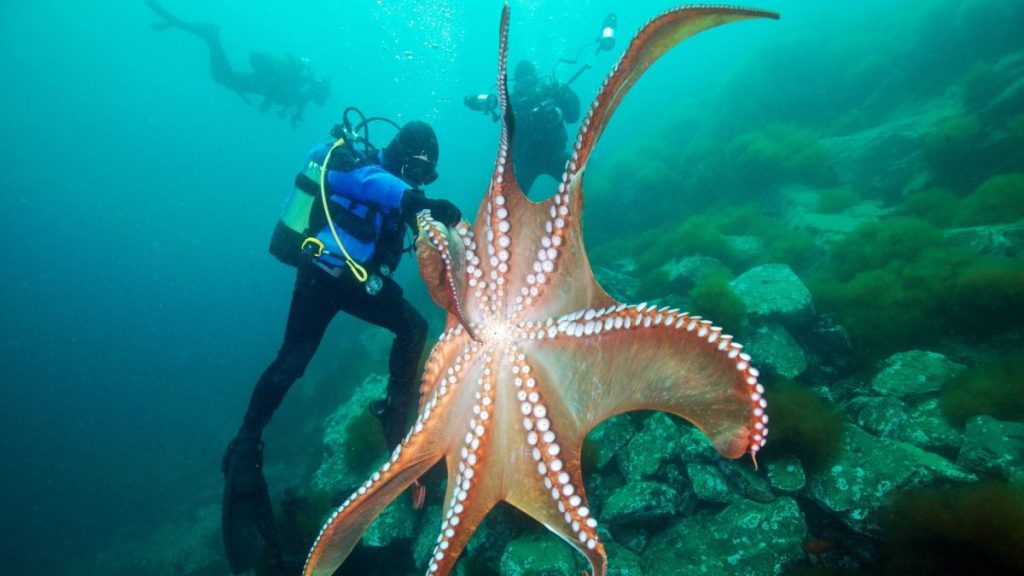Three divers looking at a Giant Pacific Octopus (Enteroctopus dofleini) in the Sea of Japan. (Image credit: Alexander Semenov via Getty)
Octopuses are iconic for their eight arms. But how many hearts does an octopus have?
It turns out that an octopus has three hearts, Kirt Onthank (opens in new tab), an octopus biologist at Walla Walla University in Washington, told Live Science. The same holds true for their closest relatives, squid and cuttlefish.
The octopuses’ largest heart, the systemic heart, is located in the middle of the mollusk’s body. It pumps oxygenated blood around the body, but not to the gills. “It is the largest and most muscular of the three hearts,” Onthank said.
The other two hearts are called the branchial hearts, each of which is attached to one of the octopus’s two gills, “so they are often called the ‘gill hearts,'” Onthank said.
Each branchial heart’s job is to pump blood through the gill it is attached to. “These hearts are relatively small and not especially strong,” Onthank said.
Related: How do octopuses change color?
So why does an octopus need three hearts? “The same reason that humans and other mammals need four chambers in their hearts — solving the problem of low blood pressure,” Onthank explained.
Animals need enough blood pressure to deliver blood throughout their bodies effectively. If a person suffers from low blood pressure, “they can get lightheaded or even pass out if they stand up too fast or exert themselves,” Onthank noted. “This is because the low pressure isn’t sufficient to deliver blood to the brain.”
Octopus gills help draw in vital oxygen from the water, and the branchial hearts help pump oxygen-poor blood through the gills. However, the oxygen-rich blood that emerges from the gills comes out at low pressure, “which is not good for sending blood to the body,” Onthank said. So octopuses “have another heart after the gills to pressurize the blood again so that it can be sent to the body efficiently,” he explained.
Humans have a similar problem. The right two chambers of the heart — the right atrium and the right ventricle — pump oxygen-poor blood from the veins into the lungs. When oxygen-rich blood leaves the lungs, it comes out at low pressure, Onthank said.
However, humans then send this oxygen-rich blood back to the heart — specifically, to the left two chambers: the left atrium and the left ventricle. These chambers repressurize the blood and send it through the arteries to the rest of the body.
In other words, octopuses and humans solve the same problem in two very different ways: octopuses by having multiple hearts, and humans by having a heart with multiple chambers.
In the human circulatory system, the heart pumps oxygen-poor blood from the veins into the lungs, where the blood picks up oxygen. Then, the blood returns to the heart, where it is re-pressurized and sent to the rest of the body. (Image credit: Nandalal Sarkar via Getty Images)
“In the end, those three hearts are accomplishing the same task that your four-chamber heart does,” Onthank said. “Octopuses are a great example of how a complex, intelligent organism could evolve in a completely separate lineage from vertebrates. They have the same problems but have hit on different solutions.”
Intriguingly, a 1962 study (opens in new tab) suggested that the systemic heart of the giant Pacific octopus (Enteroctopus dofleini) might totally stop “for long periods of time when they are resting, when they don’t need high blood pressure as much,” Onthank said. Instead, “the gill hearts do all the work.”
In addition, octopus hearts stop for a few moments when they swim, and no one is certain why, Onthank said.
“I think the best explanation is that swimming puts such high pressure on their hearts that it is better just to stop them for a few moments while swimming rather than try to pump against that pressure,” Onthank said.
Octopuses swim by squirting jets of water from their bodies.
“It is a bit like filling up a balloon and releasing it to let it fly around,” Onthank said. This puts a lot of pressure on their bodies, which may prevent their hearts from pumping properly. “So rather than fighting that pressure, they may just hit the pause button on their hearts for a moment or two,” he added.
Octopuses generally prefer crawling to swimming. “Really, swimming for octopuses is kind of a mess,” Onthank said. “They blow themselves forward with the same stream of water they breathe with, so swimming messes with their breathing as well. With swimming stopping their hearts for a few moments and messing with their breathing, it isn’t surprising they don’t swim that much.”
Blue, copper-based blood
Another way in which the octopus circulatory system differs from that of humans is how their blood is blue. This is because octopuses and their cephalopod relatives use copper-based proteins called hemocyanins to carry oxygen in their blood, instead of the iron-based protein called hemoglobin that humans do.
Hemocyanins are less effective than hemoglobin at binding to oxygen at room temperature. One might then naively think this might be a reason why the octopus needs three hearts. However, hemocyanins carry more oxygen than hemoglobin in low-oxygen environments and at low temperatures, which make them more useful at sea, Onthank said.
In addition, when octopus hemocyanin binds to one oxygen molecule, that makes it more likely to glom onto another. This property, called cooperativity, makes it much better at oxygen transport than most hemocyanins, Onthank said.
All in all, in the sea, octopus hemocyanin “is at least a comparable, if not better, oxygen transport pigment than hemoglobin,” Onthank said. “Now if we are thinking about whether octopuses could conquer land, then hemocyanin would likely hold them back.”

